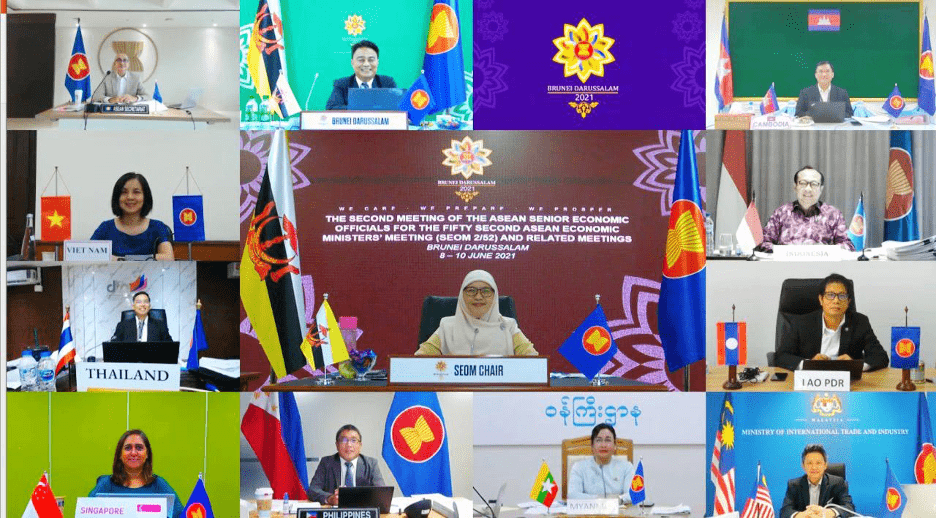MANILA—The Second Meeting of the Association of Southeast Asian Nations (ASEAN) Senior Economic Officials for the Fifty-Second ASEAN Economic Ministers’ Meeting (SEOM 2/52) and Dialogue Partner Consultations with Canada, China, India, Japan, South Korea, and the United States of America (USA) were held via video conference on 8-10 June 2021 and 14-15 June 2021, respectively.

Senior Economic Officials gathered the second time this year to further advance the implementation of ASEAN’s post-pandemic recovery efforts and to strengthen trade and investment relations with the region’s external trading partners.
The SEOM 2/52 Meeting agreed to expedite the implementation of cross-sectoral and cross-pillar initiatives that would deepen economic integration among Member States and support sectors, including micro, small and medium enterprises (MSMEs), adversely affected by the COVID-19 pandemic. Together with the ASEAN Economic Community Blueprint (AEC BP) 2025, the region is guided by the ASEAN Comprehensive Recovery (ACRF) and its Implementation Plan adopted in 2020, which serves as the region’s whole-of-community exit strategy from the COVID-19 crisis through the phases of reopening, recovery, and long-term resilience.
SEOM also tackled key deliverables for this year, such as the way forward following the recommendations under the Mid-Term Review (MTR) of the AEC BP 2025 finalized in April 2021 and the expansion of the List of Essential Goods to include food and agricultural products, such as rice, in the Memorandum of Understanding of the Implementation of the Non-Tariff Measures on Essential Goods under the Hanoi Plan of Action signed by ASEAN Economic Ministers in November 2020.
“The implementation of the ACRF, including the expansion of the list of essential goods, shows that ASEAN remains committed to ensuring the smooth flow of essential goods as we move towards recovery,” said Department of Trade and Industry (DTI) Assistant Secretary Allan B. Gepty, Philippine Senior Economic Official to ASEAN.
The SEOM also recognized the importance of working with external partners in facilitating post-pandemic economic recovery. The Philippines expressed its openness in deepening economic relations with Canada, China, India, Japan, South Korea, and the USA through the possible improvement of existing Free Trade Agreements (FTAs), embarking on new FTA negotiations, and the development of new trade and investment arrangements, among others.
The Philippines manifested its readiness to explore further cooperation with Dialogue Partners to expedite economic recovery, and to address the disruptions that have affected regional supply chains, financial markets, and human capital investments.
In particular, the Philippines conveyed its support to work with ASEAN and Canada in finalizing the remaining deliverables to assess the merits of a possible ASEAN-Canada FTA. The review and possible upgrade of commitments under the ASEAN-Korea FTA, ASEAN-China FTA, and ASEAN-India FTA were also discussed.
While FTAs are envisioned to usher in post-pandemic recovery, such economic growth and development must be sustainable and inclusive. The Philippines emphasized that real economic development requires just and equitable growth and must promote the welfare of all sectors of society especially the marginalized.
“While trade is a potent mechanism to facilitate growth and development, it can also contribute to inequality should there be no reliable rules that ensure open, free and fair trade. Similarly, there has to be appropriate policy space to address fundamental change in circumstances. Policies, programs and even cooperation projects must be geared towards levelling the playing field, and empowering vulnerable sectors of the society such as MSMEs, workers, professionals, women, and indigenous peoples.” Asec. Gepty added.
In line with this, the Philippines expressed support to Japan’s advocacy on strengthening supply chain resilience and promoting green growth, including through a Supply Chain Resilience Forum (SCRF) and the proposed Economic Ministers’ Meeting on Promoting Green Growth.
Furthermore, Korea’s proposal to establish an ASEAN-Korea Industrial Innovation Center (AKIIC) was welcomed by the Philippines with the objective of developing industrial technology cooperation through technology transfer, joint research and development programs, and stronger networking between ASEAN and Korea. The Philippines has expressed its interest in hosting the AKIIC.
Other efforts discussed by SEOM include the realization Brunei Darussalam’s Priority Economic Deliverables, such as the Non-Tariff Measures (NTM) Cost-Effectiveness Toolkit, pursuing cooperation on the circular economy, digital integration, and strengthening GVCs, as well preparations for the 53rd ASEAN Economic Ministers’ Meeting in September 2021. ♦
Date of Release: 22 June 2021


